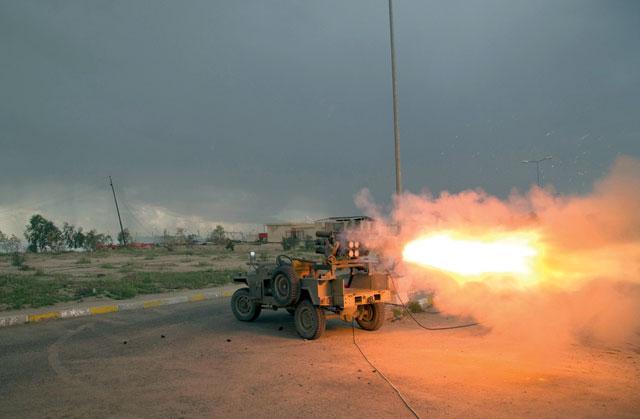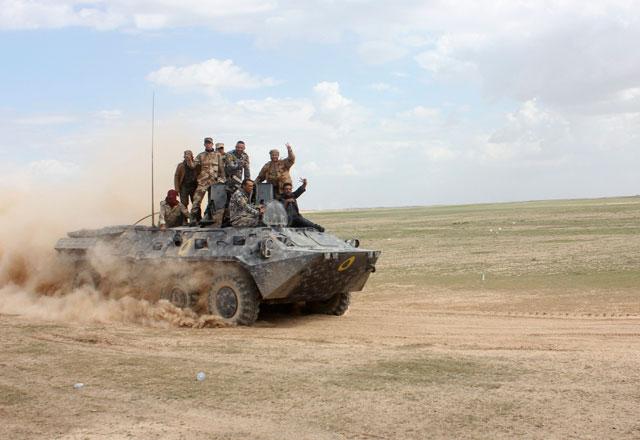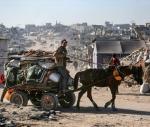You are here
Concern grows for civilians as Iraq tightens noose on Tikrit
By AFP - Mar 04,2015 - Last updated at Mar 04,2015

KIRKUK, Iraq — Concern mounted Wednesday over the fate of civilians in Tikrit where Iraqi forces were trying to trap Daesh militants on the third day of a huge offensive to retake the jihadist stronghold.
On Monday, around 30,000 Iraqi security forces and allied fighting units launched the biggest anti-Daesh ground operation yet in Iraq, closing in on Tikrit from at least three directions.
A senior commander said operations were focused on cutting supply lines to stop reinforcements and weapons from reaching the jihadists, who have controlled the city since June.
The next step will be to "surround the towns completely, suffocate them and then pounce on them", Lieutenant General Abdel Amir Al Zaidi told AFP.
Iraqi forces have yet to retake Ad Dawr and Al Alam, towns south and north of Tikrit respectively, but some units were already on the edge of the city, military sources said.
Zaidi said the operation launched Monday had already achieved results by securing areas further out in Salaheddin province and forcing Daesh fighters to regroup in urban areas.
"The first phase of the battle to liberate Salaheddin was successfully completed — and in record time — by clearing the areas in the east of the province," he said.
The Iraqi forces' advance has been slowed by suicide car bombs, roadside bombs and sniper fire, as Daesh fighters retreated to urban positions but seemed unable to fight back in open areas.
Revenge killings
Government forces, Shiite militias and volunteer units have been supported by Iraqi jets and helicopters, as well as Iran.
"This is the most overt conduct of Iranian support," General Martin Dempsey, chairman of the US Joint Chiefs of Staff, told senators Tuesday.
"Frankly, it would only be a problem if it resulted in sectarianism," he said.
Sectarianism-fuelled revenge killings have been a feature of past operations against Daesh, however, and rights groups expressed concern Wednesday.
“Shiite paramilitary militias have often carried out reprisal sectarian attacks against Sunni civilians who are not involved in the hostilities,” said Amnesty International’s senior crisis response adviser Donatella Rovera.
“We are concerned about the possible recurrence and increase of such attacks in the ongoing operations,” she told AFP.
Some leaders and fighters have described the operation as an opportunity to avenge the June 2014 massacre by Daesh of hundreds of new, mostly Shiite, recruits from the nearby base of Speicher.
Some Sunni tribes have been accused of taking part in the massacre, considered the worst of its kind since Daesh swept through Iraq’s Sunni heartland and beyond in June last year.
Prime Minister Haider Al Abadi said as he announced the Tikrit operation on Sunday that residents should turn against Daesh.
In a speech to parliament the next day, he also said that “in this battle, there is no neutral party”, arguing that any Iraqi choosing neutrality was de facto siding with Daesh.
“Abadi’s statement that there can be no neutrality is worrying,” said Joe Stork, deputy Middle East and North Africa director at Human Rights Watch.
“Any person who is not participating in hostilities directly must be regarded as a civilian, and protected against deliberate or indiscriminate attack,” he told AFP.
Smugglers
Many civilians fled the cities conquered by Daesh last year but the group has in some recent cases prevented residents from leaving.
A former army officer who gave his name as Abu Ahmad fled the town of Al Alam with his wife and five children on Sunday but he had to pay a smuggler.
“We left with a ‘guide’, a guy who knows the roads. We were five families, and paid him $1,000 each,” he told AFP by telephone from Kirkuk.
The Kurdish-controlled city of Kirkuk is only 100 kilometres away but the route they took was a huge loop through the desert that saw them cover eight times that distance.
“In the time it took us to get here, I could have gone to Hajj and back,” he joked, referring to the pilgrimage to Mecca in Saudi Arabia.
He said he decided to leave because he was afraid that homes would be shelled, that Iraqi forces “would not distinguish between armed men and innocent people” and that militias would kill civilians in revenge for Speicher.
Tikrit, a Sunni city located 160 kilometres north of Baghdad on the Tigris, is of both strategic and symbolic importance in Baghdad’s fight against Daesh.
It is the hometown of former president Saddam Hussein, the remnants of whose Baath Party have collaborated with Daesh.
Commanders have also said Tikrit is a stepping stone for an even more ambitious operation aimed at retaking Mosul, the large northern city which has been the main Iraq hub of Daesh.
Related Articles
Iraqi forces closed in on Tikrit Tuesday, their progress slowed by militant snipers and booby traps, on the second day of Baghdad's largest operation yet against Daesh terror group.
Some 30,000 Iraqi troops and militia backed by aircraft pounded jihadists in and around Tikrit on Monday in the biggest offensive yet to retake one of Daesh terror group’s main strongholds.
Thousands of Iraqi troops and militiamen laid siege to jihadist fighters holed up in Tikrit on Thursday, wary of rushing into streets littered with bombs and infested with snipers.
















